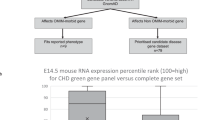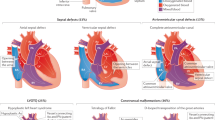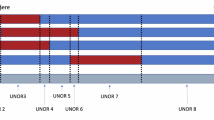Abstract
Background:
Congenital heart diseases (CHDs) are often associated with other congenital anomalies, dysmorphic features, and developmental delay, and only a few cases of chromosomal abnormalities are detected by conventional cytogenetic techniques. The microarray comparative genomic hybridization (CGH) analysis allows the identification of submicroscopic genomic rearrangements.
Methods:
During the past 3 y, 55 of 330 patients referred for array CGH had CHD of unknown etiology plus at least one additional indication of abnormal chromosomal phenotype. High-resolution 1 × 244K or 4 × 180K Agilent arrays were used in this study (average resolution 7–13 kb).
Results:
Copy-number variations were detected in 37 of 55 patients, and in 29 of 37 patients there were genes that have been associated with CHD. All 37 patients had at least one additional phenotypic abnormality: 30 of 37 had one or more other congenital anomalies, 23 of 37 had dysmorphic features, 16 of 37 had intellectual disability, 13 of 37 had abnormal magnetic resonance imaging, 10 of 37 had hypotonia, and 7 of 37 had seizures. In 9 of 55 patients, unexpected genomic rearrangements in relation to their phenotype were identified.
Conclusion:
In patients with CHD and at least one additional indication of abnormal chromosomal phenotype, array CGH analysis could detect possible submicroscopic chromosomal abnormalities and provide proper genetic counseling.
Similar content being viewed by others
Log in or create a free account to read this content
Gain free access to this article, as well as selected content from this journal and more on nature.com
or
References
Hoffman JI, Kaplan S . The incidence of congenital heart disease. J Am Coll Cardiol 2002;39:1890–900.
Richards AA, Garg V . Genetics of congenital heart disease. Curr Cardiol Rev 2010;6:91–7.
Ferenez C, Rubin JD, Loffredo CA . Use of prescription and non-prescription drugs in pregnancy. The Baltimore-Washington Infant Study Group. J Clin Epidemiol 1993;46:581–9.
Southard AE, Edelmann LJ, Gelb BD . Role of copy number variants in structural birth defects. Pediatrics 2012;129:755–63.
Kitsiou-Tzeli S, Tzetis M, Sofocleous C, et al. De novo interstitial duplication of the 15q11.2-q14 PWS/AS region of maternal origin: clinical description, array CGH analysis, and review of the literature. Am J Med Genet A 2010;152A:1925–32.
Tzetis M, Kitsiou-Tzeli S, Frysira H, Xaidara A, Kanavakis E . The clinical utility of molecular karyotyping using high-resolution array-comparative genomic hybridization. Expert Rev Mol Diagn 2012;12:449–57.
Cordeiro JM, Marieb M, Pfeiffer R, Calloe K, Burashnikov E, Antzelevitch C . Accelerated inactivation of the L-type calcium current due to a mutation in CACNB2b underlies Brugada syndrome. J Mol Cell Cardiol 2009;46:695–703.
Barc J, Briec F, Schmitt S, et al. Screening for copy number variation in genes associated with the long QT syndrome: clinical relevance. J Am Coll Cardiol 2011;57:40–7.
Klaver EC, Versluijs GM, Wilders R . Cardiac ion channel mutations in the sudden infant death syndrome. Int J Cardiol 2011;152:162–70.
Richards AA, Santos LJ, Nichols HA, et al. Cryptic chromosomal abnormalities identified in children with congenital heart disease. Pediatr Res 2008;64:358–63.
Thienpont B, Mertens L, de Ravel T, et al. Submicroscopic chromosomal imbalances detected by array-CGH are a frequent cause of congenital heart defects in selected patients. Eur Heart J 2007;28:2778–84.
Sørensen KM, El-Segaier M, Fernlund E, et al. Screening of congenital heart disease patients using multiplex ligation-dependent probe amplification: early diagnosis of syndromic patients. Am J Med Genet A 2012;158A:720–5.
Author information
Authors and Affiliations
Corresponding author
Rights and permissions
About this article
Cite this article
Syrmou, A., Tzetis, M., Fryssira, H. et al. Array comparative genomic hybridization as a clinical diagnostic tool in syndromic and nonsyndromic congenital heart disease. Pediatr Res 73, 772–776 (2013). https://doi.org/10.1038/pr.2013.41
Received:
Accepted:
Published:
Issue date:
DOI: https://doi.org/10.1038/pr.2013.41
This article is cited by
-
Copy number variant analysis for syndromic congenital heart disease in the Chinese population
Human Genomics (2022)
-
Chromosomal microarray analysis in developmental delay and intellectual disability with comorbid conditions
BMC Medical Genomics (2018)
-
Identification of Novel Congenital Heart Disease Candidate Genes Using Chromosome Microarray
Pediatric Cardiology (2018)
-
Chromosome microarray analysis in the investigation of children with congenital heart disease
BMC Pediatrics (2017)
-
Human Induced Pluripotent Stem Cell-Derived Cardiomyocytes as a Model for Heart Development and Congenital Heart Disease
Stem Cell Reviews and Reports (2015)



